Sorkin's New Statement
"The first step in solving any problem is recognizing that there is one. America is not the greatest country in the world anymore." — Will McAvoy, "Newsroom."
I love Aaron Sorkin's writing, so I can't be totally rational when evaluating his shows. I am one of those who had a slavish devotion to both "The West Wing" and "Sportsnight," and I watched "Studio 60 on the Sunset Strip" to the bitter end, even though it certainly didn't match the quality anyone expected. So it was with great anticipation that I awaited Sorkin's latest televised endeavor, "Newsroom," which debuted on HBO on Sunday night.
The show is another behind the scenes style show, set this time in the world of cable news. Will McAvoy (Jeff Daniels) is a talented news anchor that has finally had enough of playing it neutral and goes off during a televised interview at a local college. In response to his seismic shift, he gets a new executive producer, McKenzie McHale (Emily Mortimer), and a new approach to giving the news.
The show has been savaged for its political approach, high-minded speeches, long-winded dialogue, and historical approach. The show picks up a couple years in the past, allowing Sorkin to, in a sense, comment on the biggest stories of the past few years and try to re-write history a bit.
There is an ideology and philosophy on news that comes through this show that I resonate with. I was a journalism major, and part of the reason that I wanted to study that and pursue a career in journalism is the nobility of the profession. That is a big part of what journalism used to be, noble. That nobility came in the way that news was reported, the way stories were pursued, and the way that news broadcasts were about educating and informing the public.
It's not that way anymore. News, like so much else in our society, has become about entertainment. The 24-hour-a-day access afforded to people now has made broadcasts as much about opinion and entertainment as the presentation of facts. Now, as the show correctly points out, you can decide what facts and opinions you want on each topic through the selection of the right channel. There isn't a lot of nobility in the process.
When you see movies like "Good Night and Good Luck," or "All the President's Men," and you realize that journalism used to be about the truth, informing the public, and effecting real change, it's hard not to get disheartened about the product we see now. I think it's clear Sorkin feels that way, and "Newsroom" is a bit of wish fulfillment on his part. And there is nothing wrong with that.
I also have to agree, for the most part, with his commentary on America. Though most people would like to believe the spoon-fed line that we're still the greatest country in the world, the facts don't bear that out. We don't lead the world in anything but confidence. America lacks the determination, ambition, and drive it once had. We are behind in education, the wealth disparity in this country is troubling, and we seem to be more polarized and less informed than in any previous generation. America has real problems, and those problems won't be solved unless, as Sorkin said through McAvoy in the pilot for "Newsroom," we admit there is a problem.
So from an ideological standpoint, setting political perspectives aside, I appreciate what Sorkin is trying to do. I agree that news broadcasts could and should be better, and I agree that the American public, as much as we don't want to, needs to face up to the real problems plaguing our country if we are to create a brighter future.
What hurts with "Newsroom" is the context through which the story is told. I didn't always agree with the political viewpoint in "The West Wing," but I liked the debate on issues and the process. "The West Wing" presented an idealized vision of what the political process could be. In the same way, Sorkin wants "Newsroom" to be an idealized vision of what news gathering and reporting could be. And that would be OK if he followed the same model.
With "The West Wing," Sorkin often tackled key issues and debates of the day, but they were fictionalized. The people in the stories were fictional, the countries were fictional, and the problems were fictional. They mirrored real life, but they weren't taking shots at the real life responses. That helped make the point, further debate, and keep the show grounded in the world of entertainment.
With "Newsroom," the plan seems to be to tackle the actual stories and put a spin on them. The show is behind contemporary America by a couple years, allowing the show to re-hash and criticize the news gathering of that period, the major stories of that period, and the ways that reflects the shortfalls of society. The result is a glib, overly preachy approach that undermines the somewhat commendable and noble goals of the show. That was the tension I felt in the premier episode.
I like Sorkin's writing, and I like the ideological reasons for crafting this show. The acting and production works, but the idea of shinning a magnifying glass on our recent past and making declarative statements about the shortfalls of America with the advantage of hindsight doesn't quite work for me.
I still like the show, and I still like Sorkin, but I would like it more if it didn't feel like an angry attack coming two years too late.




Comments
Post a Comment